No Sugar Diet: 7 Health Benefits, Food List & Easy Recipes
Ditch sugar to embrace the recipe for a healthier, energetic, and sweeter life!
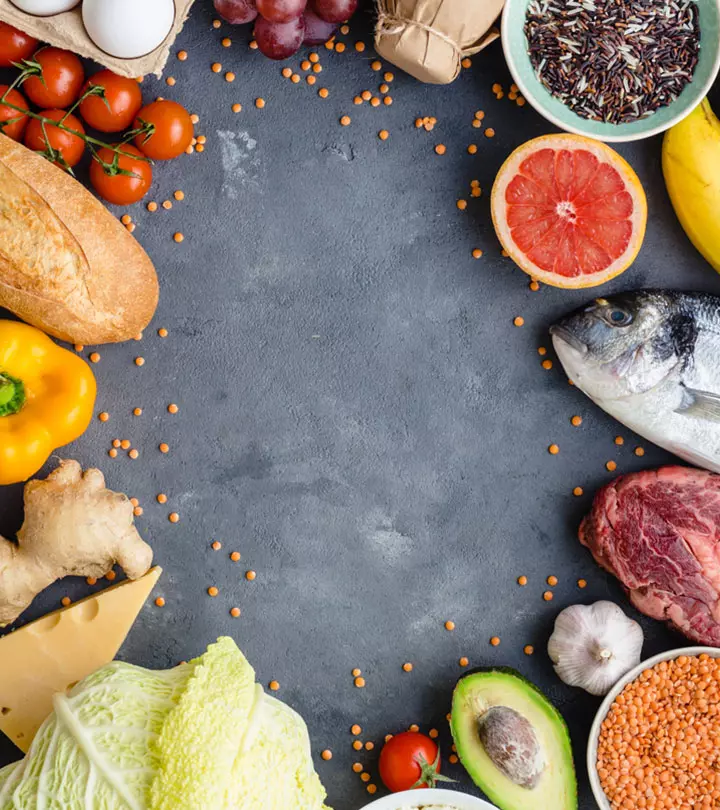
Image: Shutterstock
Imagine a life where you feel lighter, healthier, and more energetic. That is what a no-sugar diet plan can offer. While sugar makes your dishes sweeter, it also comes with a hidden cost. Excess sugar consumption can lead to various health issues. But by eliminating added sugar from your diet, you can enjoy the natural flavors of your dishes while reaping their health benefits.
This article will explore the health advantages of a no-sugar diet, the delicious food options available, and also the potential challenges of adopting a sugar-free lifestyle. Continue reading and learn to make informed choices for a healthier life.
 At A Glance: No-Sugar Diet
At A Glance: No-Sugar Diet- Principle: Restriction of all added sugars and processed foods with hidden sugars.
- Purpose: To regulate blood sugar levels, improve heart and liver health, and manage weight.
- Who Is It For: People with heart issues, weight gain, type 2 diabetes, and liver disease.
- Duration: Long-term
- Who Should Avoid: People with low blood sugar levels
- Cons: May cause headache, stress, fatigue, and nausea during the first two weeks
In This Article
What Is A No-Sugar Diet?

A no-sugar diet or a sugar-free diet restricts or eliminates added sugars. It not only excludes sugary foods like candy, sweets, and soda, but also savory foods like tomato sauce and low-fat yogurt that may have hidden sugars.
Any type of caloric sweetener added to foods is considered a part of “sugary” foods. As per the guidelines by the US Department of Agriculture (USDA), the upper limit of added sugar consumption is at 10% of your total energy intake (amounting to 50 g per day (200 kcal) for a prototype 2000 kcal/day diet) (1).
Research suggests that the top sources of added sugars used by US adults are sweetened beverages (42%), tea (12%), sweet bakery products (11%), and jams/syrups/sugars (7%) (2). However, the top sources could be different among children and adolescents.


Main Food Groups Contributors To Added Sugar Intake In Children And Adolescents
Source: Magriplis, E., Michas, G., Petridi, E., Chrousos, G. P., Roma, E., Benetou, V., Cholopoulos, N., Micha, R., Panagiotakos, Dietary Sugar Intake and Its Association with Obesity in Children and AdolescentsAnother study found that a 20% reduction in the intake of added sugars may reduce the prevalence of hepatic steatosis,i Commonly known as fatty liver disease, it is a condition characterized by the accumulation of excess fat in the liver. non-alcoholic steatohepatitisi A non-alcoholic condition characterized by liver inflammation and damage due to excessive fat accumulation. , cirrhosisi An advanced stage of liver scarring that may develop due to hepatitis, alcoholism, or fatty liver disease. , hepatocellular carcinomai A primary liver cancer that originates in the liver cells. It often develops in people with chronic liver diseases such as hepatitis C. , obesity, type 2 diabetes, and coronary heart disease (CHD) (1).
Understanding the distinction between added and natural sugars is a powerful tool that can guide your dietary choices and empower you to take control of your health. This knowledge can help you make informed decisions about your eating, leading to long-term health benefits. Scroll down to learn more about this vital aspect of nutrition.
Key Takeaways
- A no-sugar diet restricts or completely eliminates added sugars from your diet.
- It can help manage your weight, lower blood pressure, and reduce the risk of heart disease and type 2 diabetes.
- A sugar-free diet should include lean proteins, healthy fats, and whole fruits and vegetables.
- You may experience sugar withdrawal symptoms such as headache, dizziness, and fatigue in the initial days of the no-sugar diet.
Added Sugar Vs. Natural Sugars
For a no-sugar diet to be effective, it is essential to understand the distinction between natural and added sugars. The sugar in soft drinks, baked goods, and flavored yogurts are examples of added sugars, which are added when meals and beverages are processed or prepared. When ingested in excess, these sugars can cause health problems like weight gain, diabetes, and heart disease and have no nutritional value.
On the other hand, whole foods, including fruits, vegetables, and dairy products, naturally contain sugars. These foods are an important component of a balanced diet because they also offer fiber, essential nutrients, and other health advantages.
Knowing these differences can enable people to continue to benefit from naturally sweet, nutrient-dense foods while consuming fewer harmful added sugars.
As you saw, a sugar-free diet can offer several health advantages in the long run. We have listed the most important of those in the section below.
Health Benefits Of A No-Sugar Diet
- May Help With Weight Loss

Excess intake of sugary foods and sweetened beverages may cause weight gain and obesity due to increased calorie intake. Regular consumption of artificially sweetened soda was linked with an increased risk of being overweight and obese (3). However, using non-nutritive sweeteners was found to possibly aid in healthy weight management (4).
- May Reduce Heart Disease Risk
A diet high in sugar and refined starch may elevate fasting triglyceridei A common type of fat found in your blood. It is derived from the foods you eat and the fat your body creates from excess calories. levels and increase the risk of cardiovascular disease (CVD). The American Heart Association recommends reducing free sugar intake and avoiding fructose (instead of sucrose) to prevent high triglyceride levels (5).
Diets high in free sugars may also promote liver fat accumulation and produce saturated fat that can elevate CVD risk (5). Hence, a sugar-free diet may help prevent heart issues caused by high triglyceride levels.
- May Promote Liver Health
Intake of added sugar may lead to liver fat accumulation and possibly cause non-alcoholic fatty liver disease (NAFLD). A low-free sugar diet for people with obesity and NAFLD may help reduce hepatic steatosis, fibrosisi The development and accumulation of scar tissue in an organ or tissue due to inflammation, injury, or disease. , and inflammation – and eventually promote liver health (6).
- May Prevent Mood Swings
Intake of sweet food, beverages, and added sugars may cause mood issues and increase the likelihood of common mental disorders. High intake of sugary foods may also cause chronic inflammation. This may cause changes in neurotransmittersi Chemical messengers that allow communication between nerve cells, neurons, and other types of cells, such as muscle or gland cells. and lead to depressive symptoms (7), (8). Lowering one’s sugar intake may prevent mood swings and reduce depression risk (9).
- May Reduce Type 2 Diabetes Risk

Habitual consumption of sugary foods may increase the risk of developing type 2 diabetes, even if a person is not overweight. This risk can be attributed to both fruit juices and artificial sweeteners. Neither of these two could be considered suitable alternatives to sugar-sweetened beverages when it comes to the prevention of type 2 diabetes (10). According to another cross-sectional study, the longer someone is exposed to sugar, the higher their risk of developing diabetes (11). Incorporating a no sugar diet can be a key strategy within a comprehensive diabetes diet, helping to stabilize blood sugar levels and support overall health.
- May Manage Blood Pressure Levels
A high intake of sugar-sweetened beverages is associated with higher levels of systolic blood pressure (12). In a prospective study done on 810 US adults, lower sugar consumption was associated with reduced levels of systolic and diastolic blood pressure (13). However, more research is warranted to understand how lowered sugar intake impacts blood pressure levels.
- May Improve Skin Health
Intake of sugary foods can increase sebum production and often cause acne. It also may lead to cross-linking of collagen fibers and result in changes in the skin structure. This may increase skin stiffness, reduce skin elasticity, and accelerate aging (14). Therefore, a sugar-free diet may help reduce these signs and improve your skin health.
Reducing your sugar intake or following a no-sugar diet has several health benefits. However, following the diet itself can be challenging. Hence, we have listed a few effective strategies in the following section that can make the transition easy for you.
How To Cut Sugar Out Of Your Diet
- Start Slow
Limit your sugar consumption for the first few weeks instead of totally eliminating it from your diet. This will help you adapt to the new low-sugar lifestyle and reduce your sugar cravings. You may consume fruits packed with natural sugars and fiber like watermelon, strawberry, peach, grapefruit, and avocado.
- Eliminate The Obvious Sources
Cut out the most obvious sources of sugar from your diet. These include soda, hot chocolate, cakes, pastries, cookies, ice creams, cocktails, etc. You can also read food labels on product packages to identify the different types of sugars to avoid.
 Pro Tip
Pro Tip- Avoid Emotional Eating
While consuming sugar when you are sad or stressed may improve your mood temporarily, it can cause more harm in the long run. Hence, try to break this habit. Maintain a food journal or replace unhealthy snacks with healthier options like nuts or fruits.
- Consume Whole Foods
Add whole foods to your diet to feel full and prevent sweet cravings. Vegetables, fruits, lean meats, tofu, unprocessed grains and legumes, nuts, seeds, milk, cheese, and yogurt are good choices. Also, taking high-fat and high-protein foods may help keep hunger pangs at bay.
- Add Other Flavors
Replace sugar with other flavors such as spices, seasonings, and other natural ingredients like honey and maple syrup to bring some variety to your meals. You may also replace sugar with cinnamon sticks, nutmeg, cardamom, etc. to enhance flavor.
These are a few tips to help you get started on your no-sugar diet plan. We will now take a look at a few no-sugar foods that you can include in your diet.
The No-Sugar Diet: Food List
The food list below will help you plan your weekly shopping list better and allow you to experiment with a variety of nutritious yet delicious ingredients every day.
| Fruits And Vegetables | Fish And Meats | Diary | Healthy Fats | Whole grains | Legumes | Beverages |
|---|---|---|---|---|---|---|
| Eggplants, green beans, mushrooms, spinach, watercress, radish, kale, celery, arugula, broccoli, bell pepper, Brussel sprouts, onions, cucumber, cabbage, carrots, spinach, asparagus, tomatoes, mustard, grapefruit, blackberries, raspberries, oranges, blueberries, watermelons, lemons, and berries | Lean cuts of beef, chicken, ground beef, pork, goat, lamb, bison, salmon, sardines, mussels, shrimps, oysters, and anchovies | Butter, ghee, cheese, yogurt, and whole milk | Avocado, coconut, and olive oils, duck tallow, walnuts, almonds, vinegar, cashews, chia seeds, and flaxseeds | Quinoa, barley, and couscous | Black beans, lentils, chickpeas, and soybeans | Water, black coffee, unsweetened carbonated water, plain tea, and matcha tea |
As you saw, you can include a wide range of foods in the no-sugar diet. But how can you do that? In the next section, we give you a diet plan that tells you what foods you can include, and when, to maximize your benefits.
The No-Sugar Diet Plan
The diet plan given below will give you an idea of what to include and how much you need to consume. While it may not be all-inclusive, it should give you a general sense of what a well-balanced low-sugar diet could look like.
| Days | Breakfast | Lunch | Snack | Dinner |
|---|---|---|---|---|
| Day 1 | 2 fried eggs with spinach and tomatoes | Mixed green salad topped with 4 oz. of grilled salmon dressed with oil and vinegar, and 1/2 cup of chickpeas | 1 oz.of plain roasted edamame with salt | 1 cup of pasta tossed with sautéed garlic, spinach, asparagus, and 4 oz. of grilled shrimp |
| Day 2 | Spinach and feta oatmeal bowl with 1/2 a grapefruit | A large mixed green salad topped with grilled chicken, avocado, cucumber, kale, and chickpeas tossed in olive oil and vinegar | 1 cup of Greek yogurt with a sliced orange or a berry of your choice | Grilled salmon with roasted Brussels sprouts and a small baked potato topped with a little butter or sour cream |
| Day 3 | 1 cup of breakfast quinoa topped with fresh mixed berries and almonds | An omelet with spinach, tomatoes, and onions served with 2 lightly buttered whole-grain toasts | 1 cucumber with hummus | A baked sweet potato topped with cheese and stir-fried vegetables |
Planning a no-sugar diet can be tricky and you may not be able to decide how to perfect a well-balanced meal. But fret not. The following recipes not only satisfy your taste buds but also align with your goal to go sugar-free.
The No-Sugar Diet Recipes
1. Spinach And Feta Oatmeal Bowl
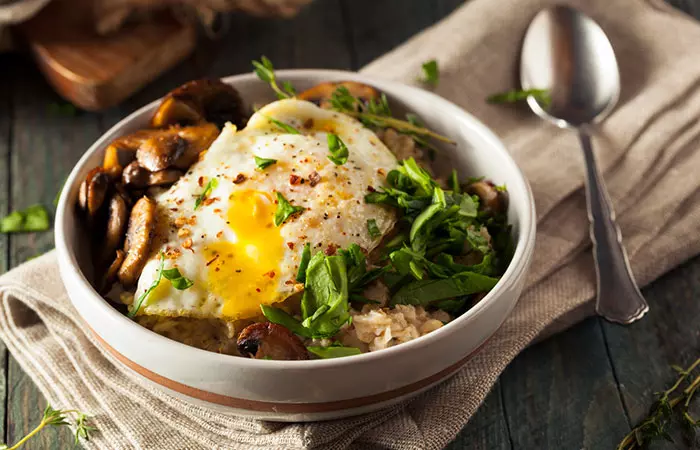
Ingredients
- 1/2 cup of rolled oats
- 1 cup of low-sodium chicken or vegetable broth
- Olive oil spray
- 2 garlic cloves, minced
- 1 cup of baby spinach
- 1 large egg
- 1 tablespoon of feta cheese, crumbled
- 1 teaspoon of black pepper
How To Prepare
- Bring the broth to a boil. Add oats and turn it to low heat.
- Stir it occasionally for about 5 minutes.
- Sauté the garlic and spinach in a non-stick pan.
- Remove them from the pan and set them aside.
- Spray olive oil on the pan and fry the egg to the desired degree.
- Transfer oatmeal into a bowl.
- Stir in the spinach and feta cheese.
- Top it with the fried egg and black pepper.
- You may serve it with a serving of fruit.
2. Green Salad With Avocado And Chicken
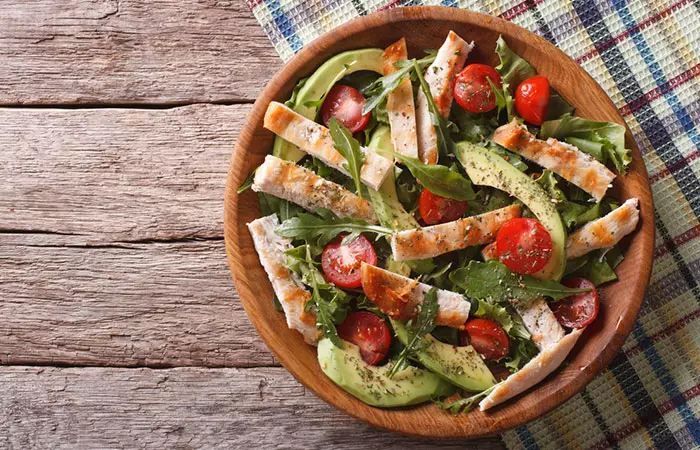
Ingredients
For the salad dressing
- 1/4 cup of freshly squeezed lemon juice
- 1 tablespoon of mustard paste
- 2 garlic cloves, grated or minced
- 1/2 cup of olive oil
- 1/2 teaspoon of salt
- 1/4 teaspoon of pepper
For the salad
- 10 ounces of mixed salad greens (2 bags)
- 1/2 red onion, thinly sliced
- 1 large avocado
- 2 large chicken breasts, cooked (8-oz. each)
How To Prepare
- Add the dressing ingredients into a small lidded jar and shake well.
- Slice the chicken into bite-size pieces and set aside.
- Cut the avocado in half, remove the seed, and slice.
- Add the mixed greens, onion slices, chicken, and avocado slices to a bowl.
- Pour about half the dressing on the greens and toss well.
- You may transfer the salad dressing to a small pitcher and use it for your next meal.
3. Roasted Edamame

Ingredients
- 12 ounces of frozen edamame in their pods
- 2 tablespoons of olive oil
- 2 garlic cloves, minced
- 1 teaspoon of salt
- ½ teaspoon of ground black pepper
Directions
- Preheat the oven to 190°C.
- Add edamame, olive oil, garlic, salt, and black pepper in a large bowl and mix well.
- Spread the mixture in a single layer on a baking sheet.
- Place it in the oven.
- Stir them halfway through the cooking time.
- Roast them until you see the edamame shells beginning to brown, which should take around 20 minutes.
- Serve the beans by popping them out of their shells before eating.
 Trivia
TriviaThese recipes can help make your no-sugar diet more satisfying. However, while it is obvious that this diet can only improve your health and wellbeing, you also need to keep a few things in mind.
Risks Of A Sugar-Free Diet Plan
A sudden change in one’s diet may cause unpleasant symptoms. You may experience sugar withdrawal symptoms based on how much sugar you are used to consuming earlier. As per anecdotal evidence, common sugar withdrawal symptoms include headaches, dizziness, fatigue, sugar and junk food cravings, and sleep issues. While these may last up to two to three weeks, it is important to overcome them to adapt to your new lifestyle.
Once you embark on this diet, you may consume other nutritious foods rich in natural sugars to maintain energy and appease your taste buds. That said, consult a doctor or nutritionist before starting this diet, especially if you have any underlying health conditions.
Infographic: 5 Reasons To Try The No-Sugar Diet
Restricting sugar from your diet can help improve your overall health and well-being. From aiding weight loss to reducing heart disease risk and improving skin health, this diet can truly turn your life around. We have listed the most important benefits of this diet in the infographic below. Take a look.
Some thing wrong with infographic shortcode. please verify shortcode syntaxEmbracing the no-sugar diet promises a lighter, healthier, and more energetic life. By following a sugar-free diet, you can savor the natural flavors of your foods while reaping several health benefits. From aiding weight loss and reducing heart disease risk to promoting liver health and mood stability, the advantages of a no-sugar diet are extensive. However, cutting sugar from your diet may be challenging. It requires gradual adjustments, eliminating obvious sugar sources, and finding healthier alternatives. Also, you may experience sugar withdrawal symptoms and may even experience other issues if you have any underlying health conditions. Therefore, consult a healthcare professional before making this important lifestyle change.
Frequently Asked Questions
What happens after 2 weeks of no sugar?
You may feel less tired and more energetic. Cutting down on sugar may improve your overall health. A study found that restricting sugar may improve your diet quality. You are more likely to increase your intake of fiber, calcium, magnesium, vitamin B2, phosphorus, vitamin C, potassium, and protein (15).
Can I eat bananas on a no-sugar diet?
Yes, you may consume bananas on a sugar-free diet as they are high in fiber. The nutrient may help improve digestion and reduce obesity risk (16).
Will cutting sugar reduce belly fat?
Cutting down sugar alone may not reduce belly fat. You also must follow a consistent exercise regimen and adopt healthy lifestyle changes to reduce belly fat.
How long after cutting out sugar will I lose weight?
Consistent exercise and a balanced diet with no or less sugar may help you reduce weight in a few months. However, the timelines may vary among individuals. A study conducted on obese and overweight individuals found that replacing caloric beverages with water or diet beverages resulted in significant weight loss in 6 months (17).
What deficiency causes sugar cravings?
Anecdotal evidence suggests that magnesium deficiency may cause sugar cravings as this nutrient may help regulate blood sugar levels. However, research is warranted to understand the exact mechanism behind this.
Illustration: No-Sugar Diet: Health Benefits, Food List, and Risks
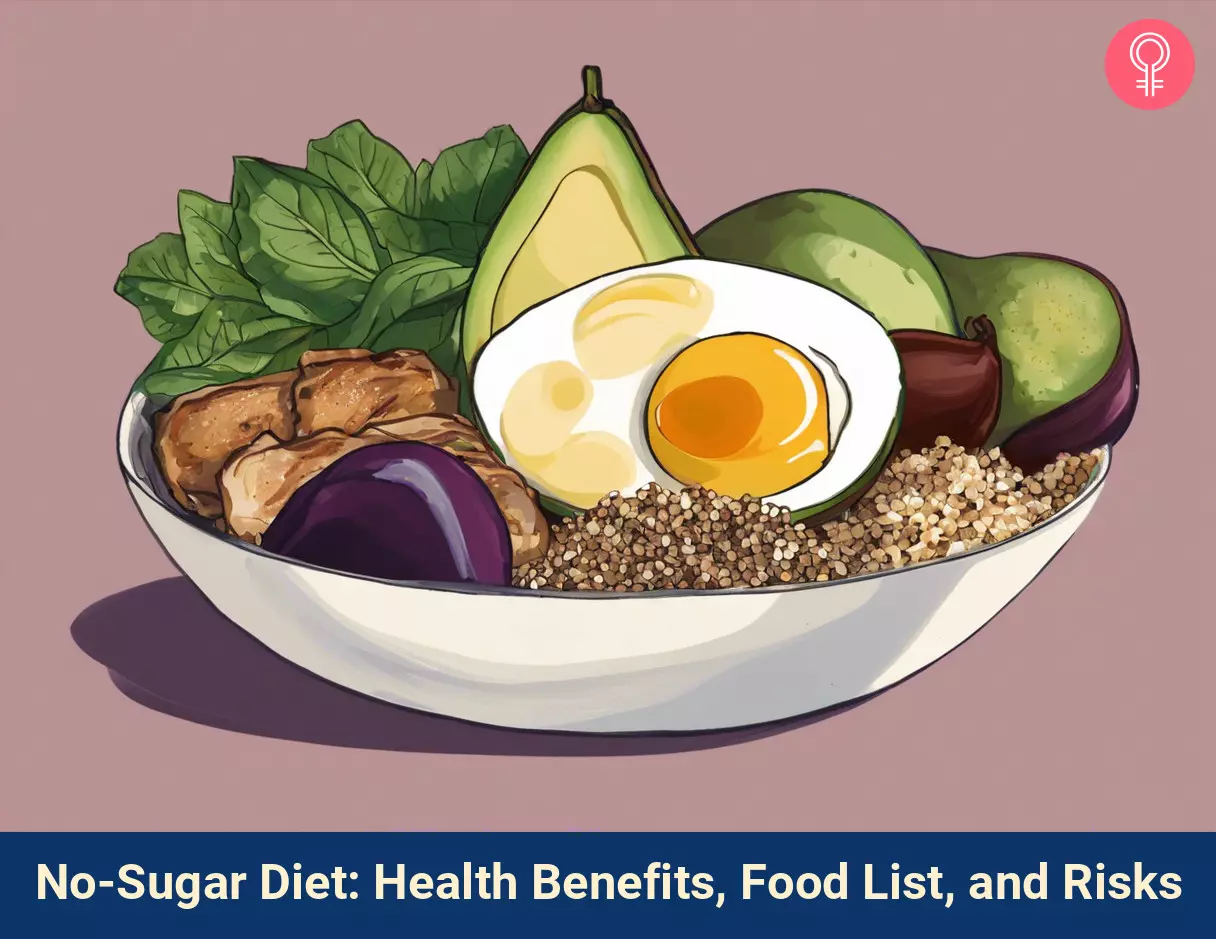
Image: Stable Diffusion/StyleCraze Design Team
Discover practical tips and tricks to effortlessly reduce sugar from your daily diet. Watch this video to take control of your health, starting today!
References
Articles on StyleCraze are backed by verified information from peer-reviewed and academic research papers, reputed organizations, research institutions, and medical associations to ensure accuracy and relevance. Read our editorial policy to learn more.
- Health and economic benefits of reducing sugar intake in the USA, including effects via non-alcoholic fatty liver disease: A microsimulation model
https://www.ncbi.nlm.nih.gov/pmc/articles/pmc5577881/ - High added sugars intake among us adults: Characteristics, eating occasions, and top sources, 2015-2018
https://pubmed.ncbi.nlm.nih.gov/36678136/ - Sugar and artificially sweetened beverages linked to obesity: A systematic review and meta-analysis
https://academic.oup.com/qjmed/article/110/8/513/3574201 - Dietary management of obesity: Cornerstones of healthy eating patterns
https://www.ncbi.nlm.nih.gov/pmc/articles/pmc5726407/ - What is the best diet for cardiovascular wellness? A comparison of different nutritional models
https://www.ncbi.nlm.nih.gov/pmc/articles/pmc7371887/ - Effects of a low free sugar diet on the management of nonalcoholic fatty liver disease: a randomized clinical trial
https://pubmed.ncbi.nlm.nih.gov/35058605/ - Role of inflammation in depression and treatment implications
https://pubmed.ncbi.nlm.nih.gov/30368652/ - Excessive intake of sugar: An accomplice of inflammation
https://pubmed.ncbi.nlm.nih.gov/36119103/ - Sugar intake from sweet food and beverages, common mental disorder, and depression: prospective findings from the whitehall ii study
https://www.ncbi.nlm.nih.gov/pmc/articles/pmc5532289/ - Consumption of sugar-sweetened beverages, artificially sweetened beverages, and fruit juice and incidence of type 2 diabetes: Systematic review, meta-analysis, and estimation of population attributable fraction
https://pubmed.ncbi.nlm.nih.gov/26199070/ - The relationship of sugar to population-level diabetes prevalence: An econometric analysis of repeated cross-sectional data
https://pubmed.ncbi.nlm.nih.gov/23460912/ - Sugar-sweetened beverages, serum uric acid, and blood pressure in adolescents
https://pubmed.ncbi.nlm.nih.gov/19375714/ - Reducing consumption of sugar-sweetened beverages is associated with reduced blood pressure: A prospective study among United States adults
https://pubmed.ncbi.nlm.nih.gov/20497980/ - Diet and dermatology
https://www.ncbi.nlm.nih.gov/pmc/articles/pmc4106357/ - “Cutting down on sugar” by non-dieting young women: An impact on diet quality on weekdays and the weekend
https://www.mdpi.com/2072-6643/10/10/1463 - Effect of banana pulp dietary fibers on metabolic syndrome and gut microbiota diversity in high-fat diet mice
https://pubmed.ncbi.nlm.nih.gov/32662541/ - Replacing caloric beverages with water or diet beverages for weight loss in adults: Main results of the choose healthy options consciously everyday (choice) randomized clinical trial
https://pubmed.ncbi.nlm.nih.gov/22301929/
Read full bio of Ritika Dass
Read full bio of Moksha Gandhi
Read full bio of Ravi Teja Tadimalla
Read full bio of Himanshi Mahajan





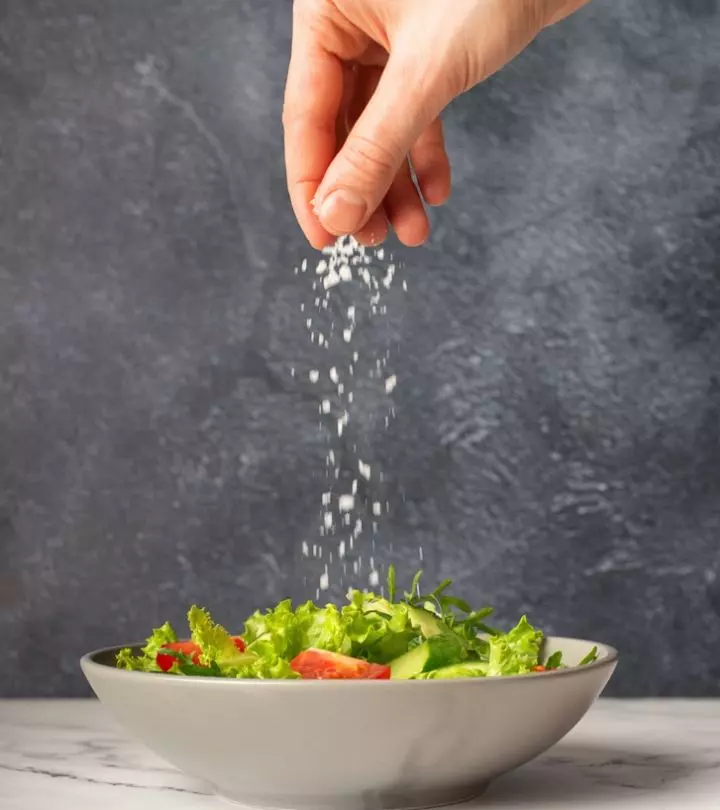

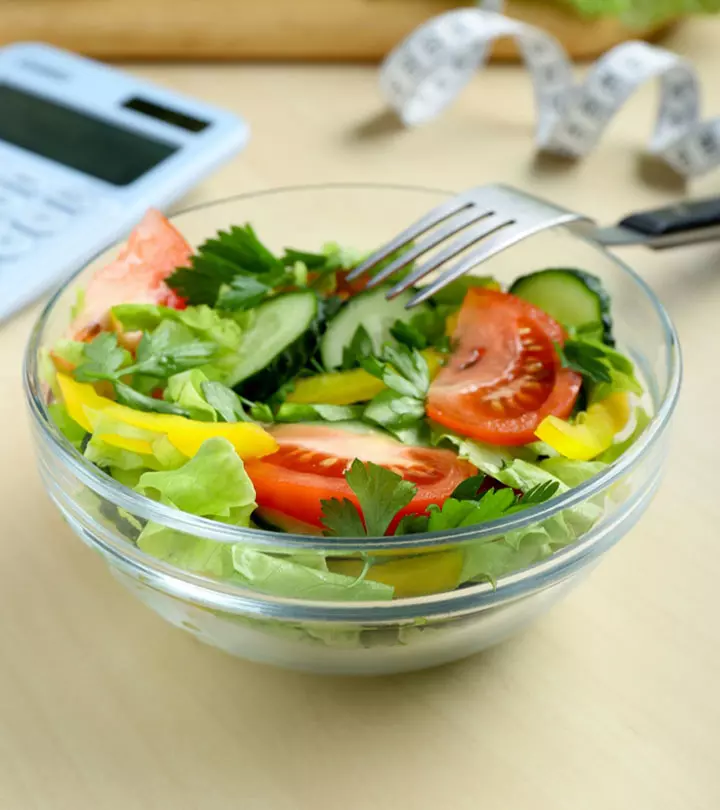
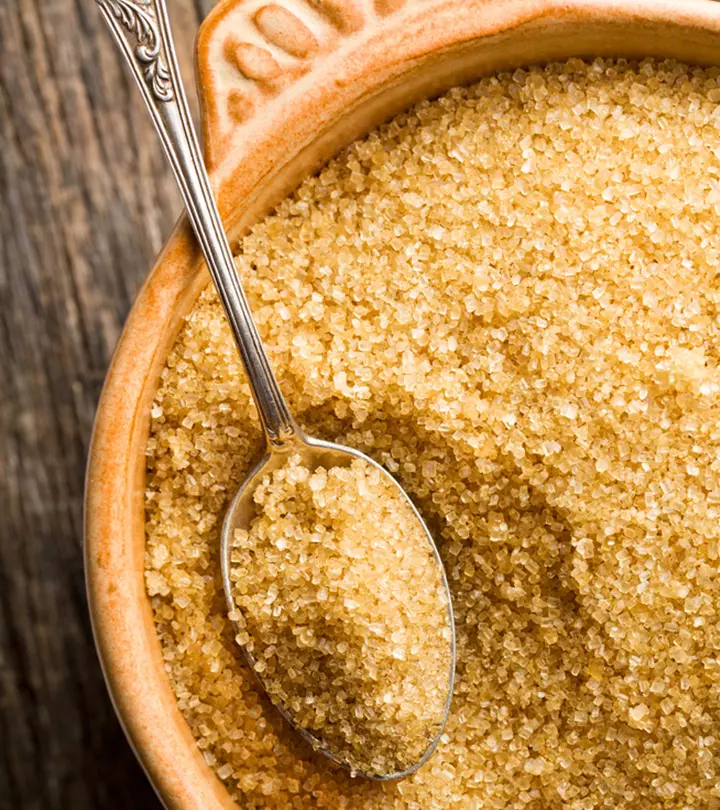
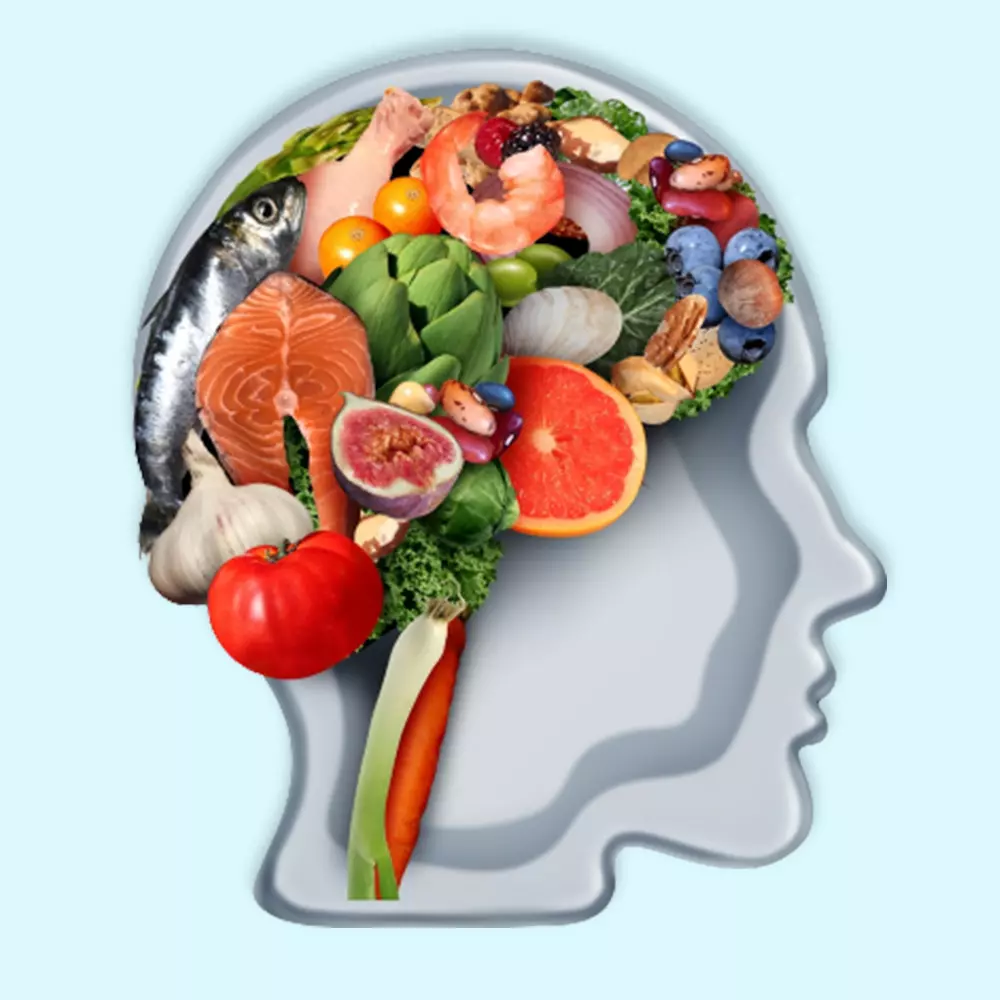
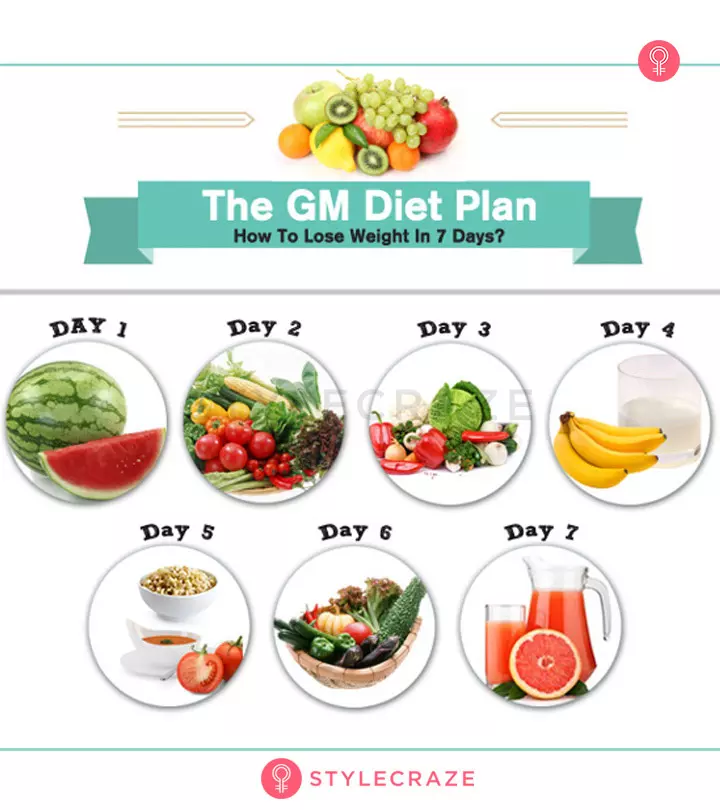
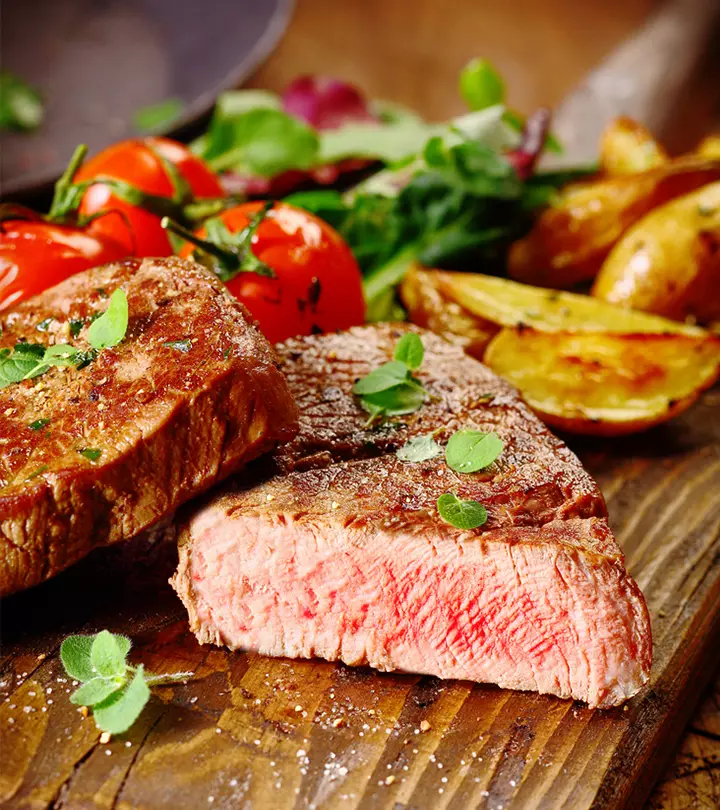



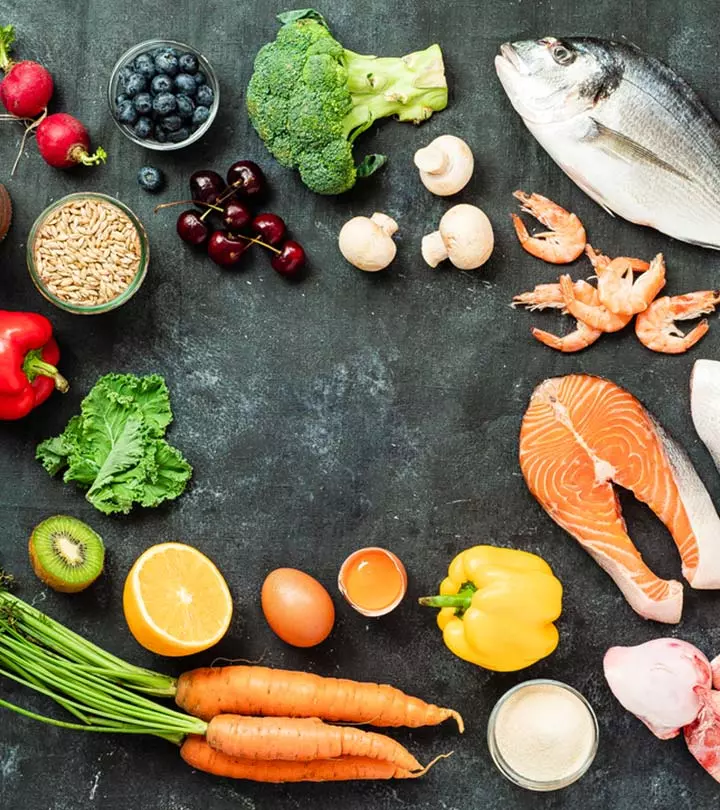

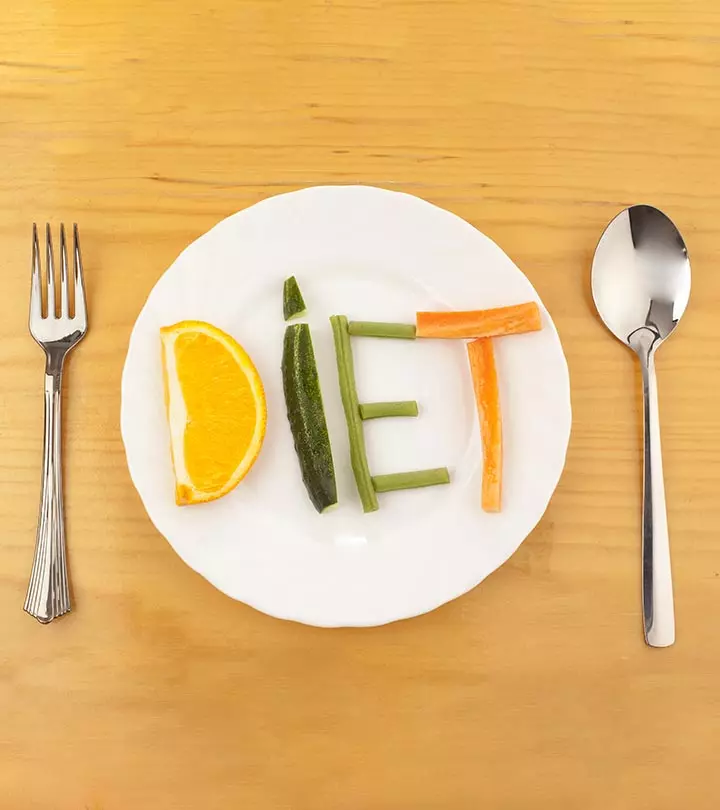
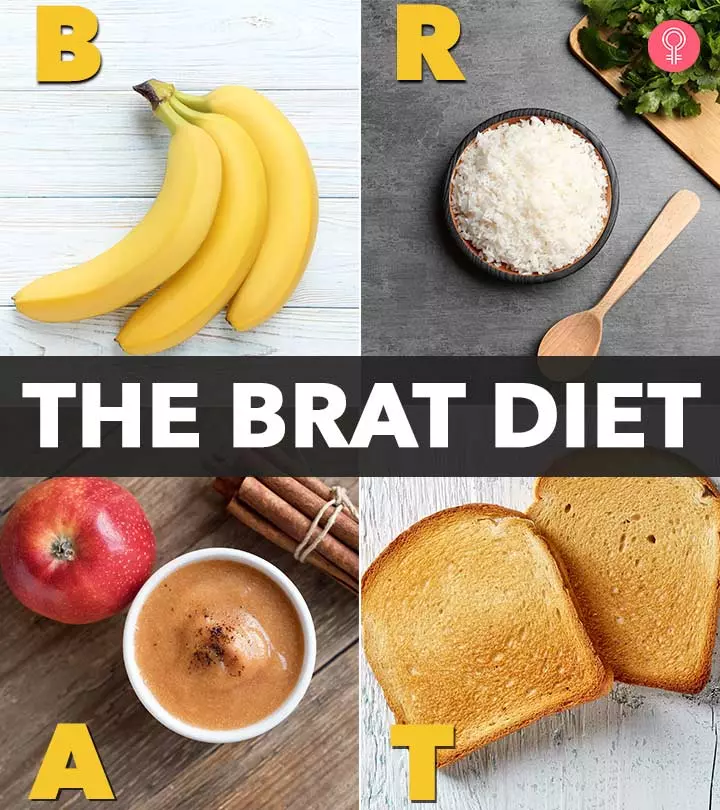

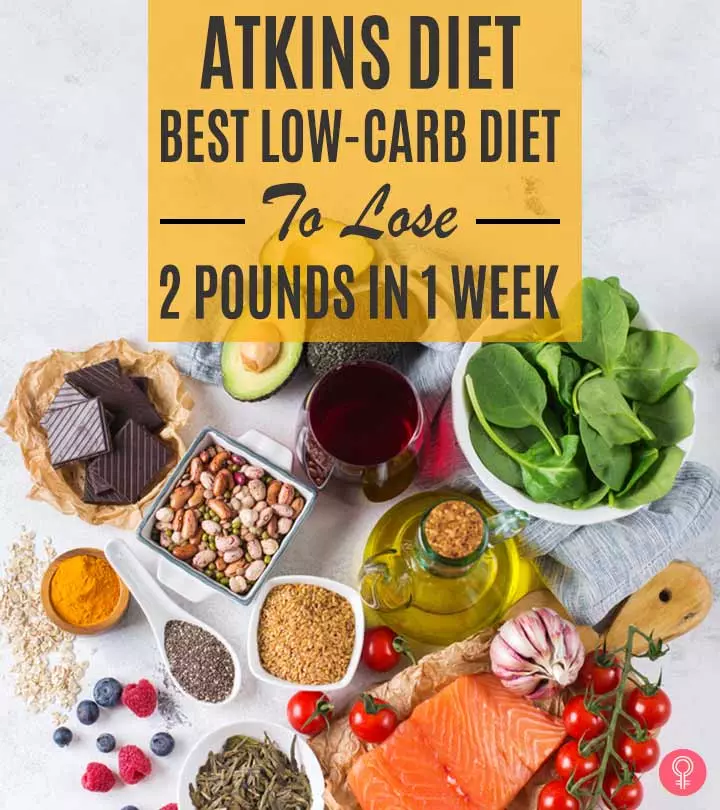




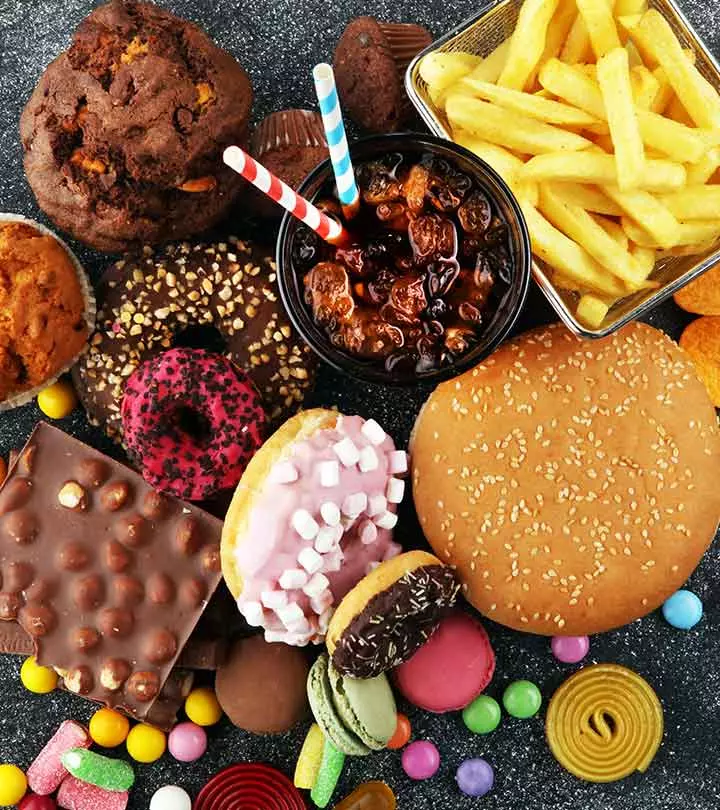
Community Experiences
Join the conversation and become a part of our empowering community! Share your stories, experiences, and insights to connect with other beauty, lifestyle, and health enthusiasts.